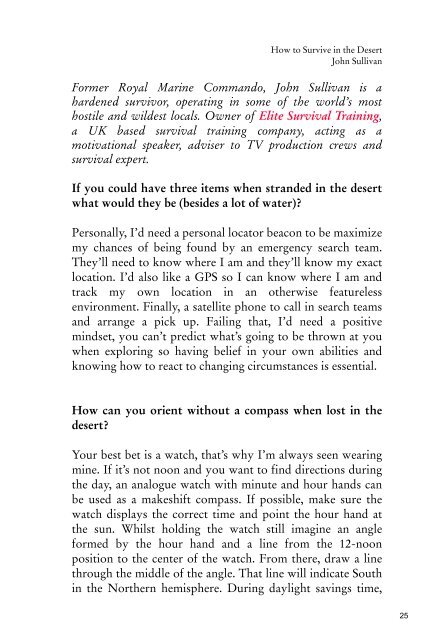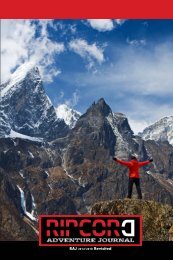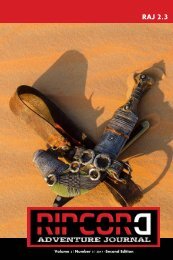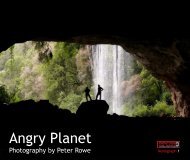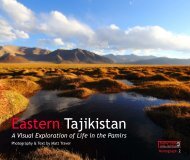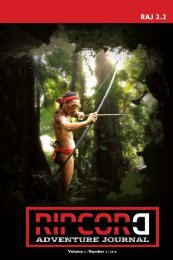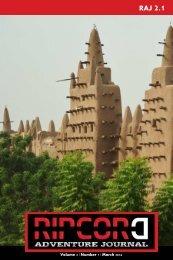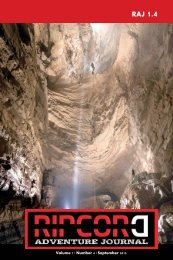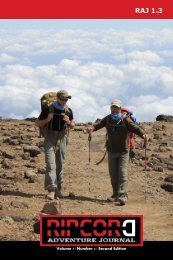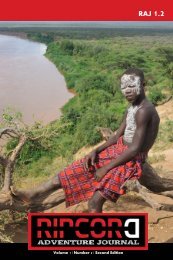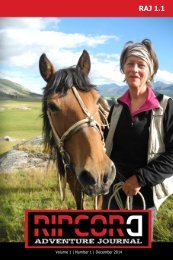Ripcord Adventure Journal 2.4
Our final issue of volume 2 is quite a mixture of adventure and exploration of the world's polar regions, deserts, oceans, mountains and jungles. In our Guest Editorial, Leon McCarron ventures in to the hills of Jordan as part of his 1000-mile journey on foot, across the Middle East, when he encounters an unexpected musical interlude on a lonely hillside. Planning is essential for major expeditions, even more important to have several back-up plans in case the first one or two, or three do not pan out as expected. Mark Wood brings us behind the scenes of planning for a polar expedition. Technology in the classroom has been touted for more than 2 decades as the next big thing. Here, Joe Grabowski, whose nascent organisation "Exploring by the Seat of Your Pants" has demonstrated that indeed technology can be the medium by which exposure to new and exciting educational contexts can be brought in to the classroom from the real-life connections with explorers, conservationists and scientists in the field. Former Marine Commando, John Sullivan gives us an introduction to what it takes to survive in the desert using the skills and experience he has built up from his time in the forces, leading expeditions and working with film crews on location. What does it take to circumnavigate the globe on one's own, what drives an adventurer to take on and complete such demanding challenges? Erden Eruc takes us with him on his life's journey across oceans and continents. Finally, we catch up with emergency medical doctor Claire Grogan and Mark Hannaford of World Extreme Medicine to discuss the fast-paced world of extreme medicine.
Our final issue of volume 2 is quite a mixture of adventure and exploration of the world's polar regions, deserts, oceans, mountains and jungles.
In our Guest Editorial, Leon McCarron ventures in to the hills of Jordan as part of his 1000-mile journey on foot, across the Middle East, when he encounters an unexpected musical interlude on a lonely hillside.
Planning is essential for major expeditions, even more important to have several back-up plans in case the first one or two, or three do not pan out as expected. Mark Wood brings us behind the scenes of planning for a polar expedition.
Technology in the classroom has been touted for more than 2 decades as the next big thing. Here, Joe Grabowski, whose nascent organisation "Exploring by the Seat of Your Pants" has demonstrated that indeed technology can be the medium by which exposure to new and exciting educational contexts can be brought in to the classroom from the real-life connections with explorers, conservationists and scientists in the field.
Former Marine Commando, John Sullivan gives us an introduction to what it takes to survive in the desert using the skills and experience he has built up from his time in the forces, leading expeditions and working with film crews on location.
What does it take to circumnavigate the globe on one's own, what drives an adventurer to take on and complete such demanding challenges? Erden Eruc takes us with him on his life's journey across oceans and continents.
Finally, we catch up with emergency medical doctor Claire Grogan and Mark Hannaford of World Extreme Medicine to discuss the fast-paced world of extreme medicine.
You also want an ePaper? Increase the reach of your titles
YUMPU automatically turns print PDFs into web optimized ePapers that Google loves.
AAAAAAAAAAAAAAAAAAAAAAAAAAAAAAAAA<br />
AAAAAAAAAAAAAAAAAAAAAAAAAAAAAAA<br />
How to Survive in the Desert<br />
John Sullivan<br />
Former Royal Marine Commando, John Sullivan is a<br />
hardened survivor, operating in some of the world’s most<br />
hostile and wildest locals. Owner of Elite Survival Training,<br />
a UK based survival training company, acting as a<br />
motivational speaker, adviser to TV production crews and<br />
survival expert.<br />
If you could have three items when stranded in the desert<br />
what would they be (besides a lot of water)?<br />
Personally, I’d need a personal locator beacon to be maximize<br />
my chances of being found by an emergency search team.<br />
They’ll need to know where I am and they’ll know my exact<br />
location. I’d also like a GPS so I can know where I am and<br />
track my own location in an otherwise featureless<br />
environment. Finally, a satellite phone to call in search teams<br />
and arrange a pick up. Failing that, I’d need a positive<br />
mindset, you can’t predict what’s going to be thrown at you<br />
when exploring so having belief in your own abilities and<br />
knowing how to react to changing circumstances is essential.<br />
How can you orient without a compass when lost in the<br />
desert?<br />
Your best bet is a watch, that’s why I’m always seen wearing<br />
mine. If it’s not noon and you want to find directions during<br />
the day, an analogue watch with minute and hour hands can<br />
be used as a makeshift compass. If possible, make sure the<br />
watch displays the correct time and point the hour hand at<br />
the sun. Whilst holding the watch still imagine an angle<br />
formed by the hour hand and a line from the 12-noon<br />
position to the center of the watch. From there, draw a line<br />
through the middle of the angle. That line will indicate South<br />
in the Northern hemisphere. During daylight savings time,<br />
25


